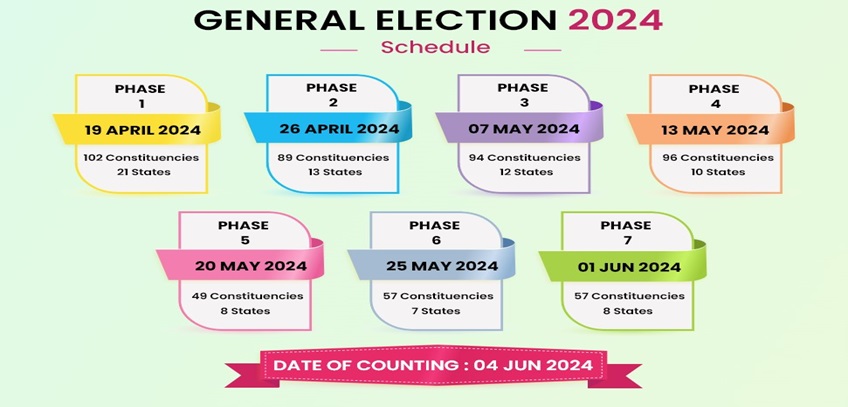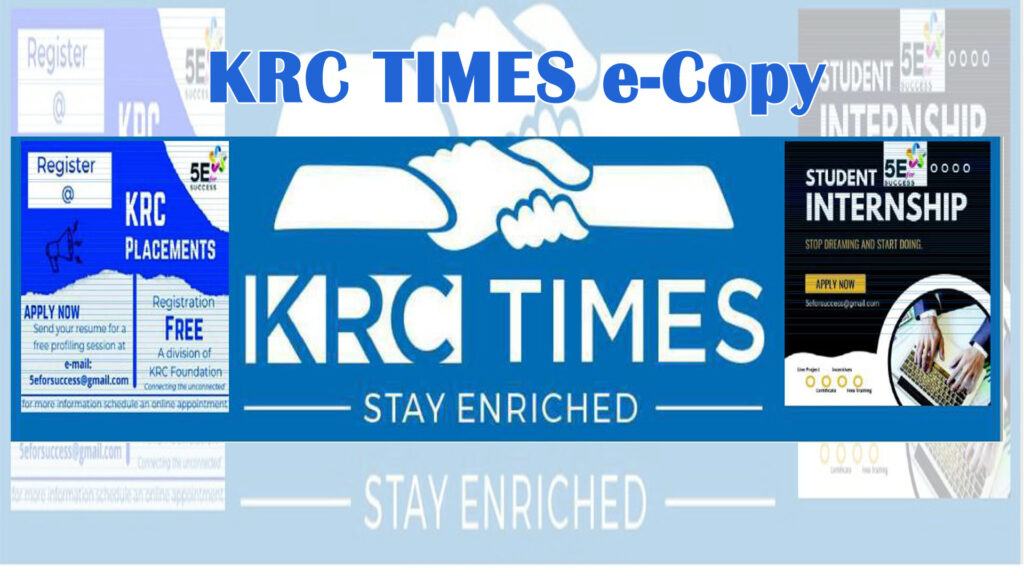Election Commission of India (ECI) on 16 Mar 2024, has announced 7 phase polls from 19 Apr to 1 June for Parliament and four State assemblies. This will be 82 days exercise from imposing model code of conduct on 16 Mar till declaration of results on Jun 4
 KRC TIMES Desk
KRC TIMES Desk

Col Shiv Choudhary (Retd)
Election Commission of India (ECI) on 16 Mar 2024, has announced 7 phase polls from 19 Apr to 1 June for Parliament and four State assemblies. This will be 82 days exercise from imposing model code of conduct on 16 Mar till declaration of results on Jun 4. This will also be world’s costliest and biggest ever election exercise. Spending by political parties and candidates to woo voters will likely cost over 1.2 trillion rupees ($14.4bn), as per an organization which regularly estimates the country’s poll expenditure ie double than elections of 2019. Near 970 million voters consisting of 500 million male and 470 million female voters including 1.82 percent first timer, will decide who will rule the world’s most populous nation.
The unprecedented election related staff and logistics are biggest challenges. These include complete ECI team, 2100 general, police, and experienced observers, roughly 3.4 lakh security personnel alongside states/UTs police, 15 million polling officials for 1.05 million polling stations, 55 lakh EVMs, few lakh vehicles, over 60 helicopters, and odd 600 special trains. There will also be use of camels, planes, boats, elephants, torches, winter clothing and packed food moving in all possible terrains and climatic conditions. The party symbols will range from bananas, comb to flute. Polling stations have been planned in a manner that no voter needs to travel beyond 2 km.
Sadly, Indian elections are known for lower voter turnout, while participation in election process is very vital as it enables voters to bring needed changes concerning climate, corruption, economy, education, environment, health care, housing, jobs, justice system, political leadership, pollution, security, and women empowerment for the next generation. Freedom to choose own government has come post lot of sacrifices. Tomorrow, it is the youngsters, who will go to war, win, die and sustain injuries, not the politicians. Voting is a way to honor those soldiers and martyrs who got us sovereignty and constitution.
Every voice matters in electing law makers and strengthening of democracy for shaping governance and policy. More voices heard at the ballot box, the more representative and inclusive the democratic process becomes. Conversely, low voter turnout can raise doubts about the fairness and integrity of the electoral process, undermines the credibility of democratic institutions, and weakens democratic process. Indeed, significant voter turnout is the life blood for empowering people and strengthening democracy.
Elected candidates make decisions that impact citizens’ lives. Voting serves as a powerful instrument for promoting social change, establishing democratic government, advancing civil rights, influence the direction of their society, and holding elected officials accountable for their actions/inactions or reject them next time for poor performance. High voter turnout contributes to the legitimacy of elected governments and helps build trust between citizens and their representatives. Voters’ voices are heard through the electoral process which fosters greater social cohesion and political stability. A diverse and engaged electorate can help prevent the rise of extremist or authoritarian movements.
Majority get swayed by the false propaganda, fake images, and often repeated social, economic, and political sops. Religion, casteism, and money power have proved to be the biggest influencer in India during the recent times. In case voters want to give due weightage to candidate’s personal image, education, experience, public service, promises aligning with own values, accessibility, track record, integrity, and secular character, and his concern for local issues, voters must hit the ballot box on the day of voting.
Voters can distinguish between who is who of campaigners, candidates, political parties and ideology, their ability to connect, charisma, communication skills, authenticity, and capacity to mobilize support. A small false message can change the voters’ perceptions overnight. Candidates often seek to mobilize support along complex social fabric, local politics, specific caste groups or forging alliances with such organizations to secure votes. Pre-election alliances and coalitions formed amongst political parties, a new intervention, can impact voters’ choices by reshaping the political landscape and influencing perceptions of candidate’s viability, visibility, and electability.
In an era marked by political polarization, corruption, tainted candidates and disenchantment, the temptation to hit the ballot box is a key decider. When a significant portion of the population abstains from voting, it not only creates a vacuum for exploitation, but also distorts and diminishes the legitimacy of the emerging government. If we exercise our voting right when needed, no rulers or leaders will have dictatorial power due to fear of being rejected next time. They may get what they want, but only to the tolerance limits of voting majority.
Significant low voting percentage despite all efforts made by the ECI is a bane for India. Some of the reasons for not voting include widespread impression that one vote won’t count, long queue, non-registration, confusion, apathetic voters, disliking for candidates, frequent elections, poor delivery record, corrupt political culture, and voters’ intimidation. However, one should know that even a single vote is crucial. AR Krishnamurhthy of JD (S) lost to R Dhruvanarayan of Congress by just one vote in the Karnataka assembly elections of 2004. There are four more instances. Also remember the Gore V. Bush scandal in Florida? That was decided by a small number of votes.
No situation would change by sitting idle while others decide your future. Importance of voting is very important for millennials. Unfortunately, carelessly, or notoriously, the millennials don’t understand this. Youth who want change, need to vote. There is a need for “Vote Early, Vote Must”. The collective “youth vote” could sway the election. You don’t want to vote for any of the lesser evils, but not voting is potentially allowing the greater evil to win. Not voting is no expression of your resentment against political class or its incompetency. Option of NOTA is always there which caters for all resentment and disagreement. Higher clicks on NOTA button are a clear warning.
During the last election held in 2019, only 616 million (67.4%) voted out of listed 912 million voters, while in 2014 elections, 280 million registered voters, did not vote. Perhaps no country in the world has these many votes. World second largest democracy USA had only 181 million registered voters in their presidential election in 2016. 280 million not voting means whole nation did not vote. Imagine why such a huge number did not vote or they could not be careless. Were they all in hospitals? No. It could be apathy, falling political culture, murky politics, and all candidates looking chips of the same flock.
There has been lot of discussions on compulsory voting including Dinesh Goswami Committee (1990), introduction of Compulsory Voting Bill, 2004 by Bachi Singh Rawat and a Pvt Bill by JP Agarwal in 2009. Certain countries like Australia along with several countries in South America including Brazil, Argentina and Bolivia totaling about 13% have a provision for compulsory voting while democracies like the UK, USA, Germany, Italy, and France have a system of voluntary voting. ECI may revisit this grey area.
The trend analysis which guides party spin doctors where to target their advertising dollars generally missed the youth because the youth vote was small on a demographics map. It is no more so, and only the youth votes can bring a change. Democracy thrives on voters, and a ‘democratic Government by, for and of the people’ cannot work without the people. The more the like-minded voters are there, the louder their voice grows. If there is one thing that is annoying actual voters, it is the endless ramblings and cribbing about any government of the day. If you don’t vote, you really have no right to complain about.
As the D Day approaches, let us heed the call to action and ensure that every voice is heard, every vote is counted, and the flame of democracy continues to burn brightly. It is perhaps time to adapt to new modes and models of voting to surpass current national trend of low voting. We are leading the world in technology, but we don’t spare a thought to change/ innovate tools for enhancing voting percentage. Yes, the possible misuse of such tools more so by ruling parties of the day, will always remain a significant challenge for the ECI. Remember the clarion call “Not voting is not a protest. It is a surrender.”



